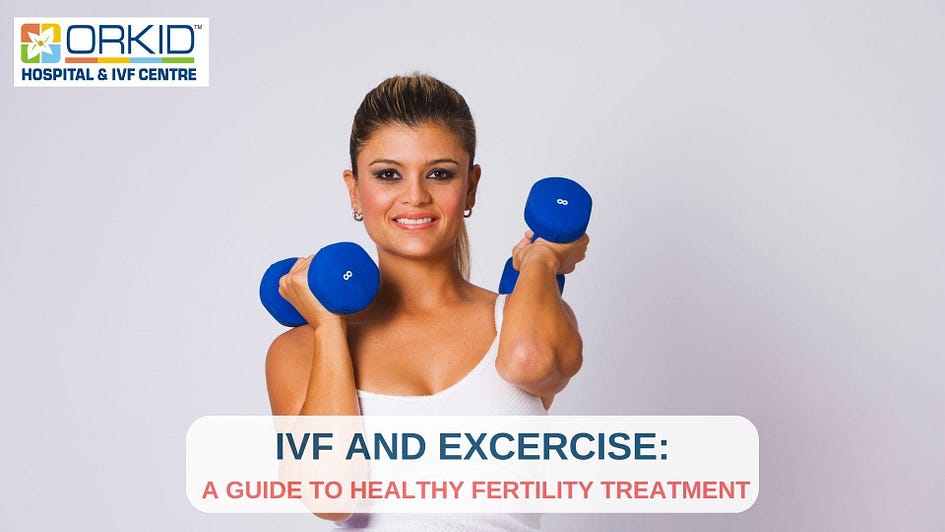
The journey toward parenthood can be a rollercoaster of emotions, hope, and challenges. In this quest, in vitro fertilization (IVF) has become a beacon of hope for many couples struggling with infertility. It’s a path filled with dedication and perseverance. As one of the Best IVF centres in Surat, we at Orkid Hospital understand the importance of providing comprehensive guidance every step of the way. Let’s bust some myths surrounding IVF and physical activity, all while keeping your dreams of parenthood at the forefront of our discussion.
Is it Possible to Engage in Physical Activity During an IVF Cycle?
The short answer is yes, it’s generally possible to engage in physical activity during an IVF cycle. However, the extent and type of exercise may vary depending on individual circumstances and where you are in your IVF journey.
How Might Physical Activity Impact Your IVF Treatment?
- Stress Reduction: Exercise can be an excellent stress reliever. IVF can be emotionally taxing, and engaging in physical activity, whether it’s yoga, walking, or jogging, can help reduce stress levels and improve overall well-being.
- Blood Flow: Physical activity can promote better blood circulation, which can be beneficial for the uterine lining and overall reproductive health. Improved blood flow may help support a successful implantation.
- Weight Management: Maintaining a healthy weight is essential for fertility. Exercise can help you achieve and maintain a healthy weight, which can positively impact your IVF outcomes.
Can Physical Activity Influence the Medication Phase of an IVF Cycle?
During the medication phase of an IVF cycle, your doctor will prescribe specific medications to stimulate egg production and regulate your reproductive hormones. While moderate exercise is generally acceptable, it’s crucial to follow your doctor’s advice regarding the level of physical activity. Strenuous exercise may need to be limited during this phase to prevent any potential complications or discomfort.
How Can Exercise Impact Egg Retrieval?
Egg retrieval is a critical step in the IVF process. It involves the removal of mature eggs from the ovaries for fertilization. Leading up to this procedure, it’s advisable to be cautious about engaging in high-impact or strenuous exercises that could potentially lead to ovarian torsion or discomfort. Always consult the best infertility centre in Surat for personalized guidance regarding exercise in the days leading up to egg retrieval.
Can I Start Exercising After an Embryo Transfer?
After the embryo transfer, it’s generally safe to resume light to moderate exercise. However, it’s essential to listen to your body and avoid any activities that cause discomfort or excessive strain. Gentle activities like walking or gentle yoga can be excellent choices during this time. Remember that your body has just undergone a significant procedure, so prioritize rest and self-care.
Which Exercises Should I Avoid During an IVF Cycle?
While it’s encouraged to stay active during your IVF journey, there are specific exercises and activities to approach with caution:
● Activities like running, jumping, and high-intensity interval training (HIIT) can put unnecessary strain on the reproductive organs during the medication and egg retrieval phases. It’s best to avoid these activities during these times.
● Lifting heavy weights can cause strain and discomfort, especially during the medication phase and immediately after egg retrieval. Some of the best IVF hospitals in Surat recommend lifting lighter weights or bodyweight exercises during these periods.
● Excessive heat can negatively impact embryo development and implantation. It’s advisable to avoid hot yoga, hot baths, saunas, or other activities that elevate your body temperature during your IVF cycle.
● While cardiovascular exercise is generally beneficial, excessive cardio workouts can lead to stress and fatigue, which can be counterproductive during your IVF journey.
Conclusion
Exercise can be a valuable component of your IVF journey, promoting overall health and well-being. However, it’s crucial to strike a balance between staying active and listening to your body’s needs.
IVF is a remarkable tool that has helped countless individuals and couples achieve their dreams of having a family. As you embark on this path, remember that your emotional well-being is as vital as your physical health. At Orkid Hospital, we understand the importance of not only providing exceptional medical care but also addressing your holistic well-being and that’s why we are known as one of the best test tube baby centres in Surat.



